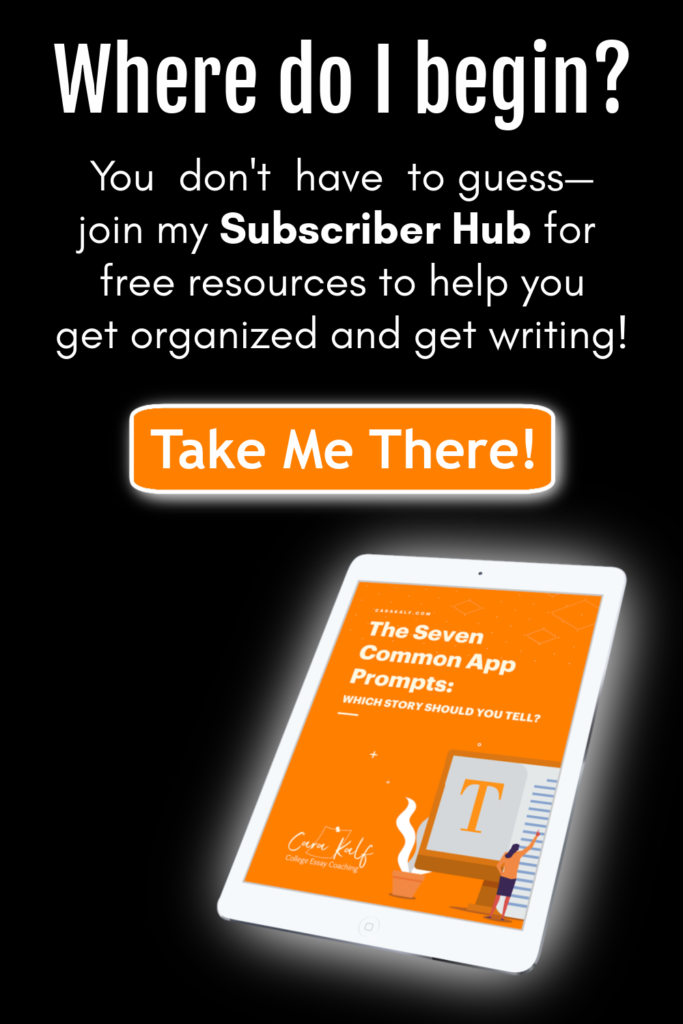The authors write, “What you have to remember is that your reader always has something better to do.” As I have told students repeatedly, Yes, we are literally paying your readers to read your essay (via the application fee)—but we are buying their time, not their hearts. Why should your reader care? The answer must be more than, “They have to read my essay because it’s their job.” We need to write with a constant awareness that we might be about to lose their attention. I consider that a healthy humility. According to the authors, the hypothetical reader of advertising copy is looking for a reason to “trash” your ad, to have one less thing cluttering or distracting their life. A similar statement might be true about the reader of the application. Are they rooting for you to fail? I strongly doubt it. But at the same time, red flags on the essay would make their decision-making easier. Don’t make it easier for them to say NO.
So we return to the “CUB critique.” One of the things that the authors note is so helpful about this critique is you don’t need an expert to get a useful opinion. Getting outside opinions on your essay is really important but always a risk—it’s hard to know which advice to trust. But you can ask almost anyone to read for things that are Confusing, Unbelievable or Boring. They don’t have to suggest changes—or if they do, you don’t have to accept their edits—but if they flag a section, that gives you valuable insight on how someone else hears your story.
If you don’t have a trusted or willing reader, you will have to evaluate for yourself. So what do these mistakes look like?
Confusing: When you’re telling a story from your own life, it’s easy to accidentally skip over pieces that are surprisingly crucial to understanding. Is it even clear what happened? How old were you when this story took place? Did you tell the key parts slowly, with enough detail that the reader feels like he or she was there or could vividly imagine it? If you skip over parts, either to simplify and shorten the story or to make it less embarrassing, does the plot still make sense, or are there strange gaps? What is your point? Masterson and Palmer warn against trying to create “mystery and suspense” at the expense of clarity. High-schoolers sometimes try to create what they believe is a “literary feel” through heavy use of metaphor or other figurative language. The question you need to ask yourself is, “What is this language attempting to convey?” If you aren’t sure what the mysterious grey figure in your introduction is symbolic of, it’s probably not doing anything for your essay, no matter how much it sounds like Poe. The authors suggest three simple fixes: Cut it out, make it more specific, or simplify. Given that you only have 650 words, cut it out is definitely the first thing you want to consider. If your story loses continuity or meaning if you cut it out, then try to find a way to make the section simpler or more specific.
Unbelievable: This is the word that made me so excited by this CUB technique—it was the issue I had felt about some pieces of student writing that I hadn’t been able to name. Palmer writes, “Your reader in the real world will have a very alert ‘B.S. meter.’ He’s seen hundreds of similar marketing pieces before.” Substitute “college application essays” for “marketing pieces” and you see the problem. Hyperbole (exaggeration) is off-putting; it can sound lazy or too self-congratulatory. Watch out for sweeping statements like “my whole life” or “I’ve always.” It’s unbelievable that you’ve always prioritized schoolwork or that you’ve loved dance your whole life. Does the win at the end sound too good to be true or tie up your former failure too neatly? Sometimes students reference something they’ve recently learned in class, but they feel it would sound better to not mention how they learned it. It doesn’t; it sounds “unbelievable.” That is, I don’t believe that you read or researched that fact on your own, so that makes me cynically wonder if someone told you the fact or you researched it just for the essay. In the same way, if you had the opportunity to do college research or communicate with a college professor, or you won some type of exclusive competition—these are all stories that bear a little more explanation. I’m more likely to believe your story of conversing with the college professor if you explain that you reached out to them based on your investigation of their specialty. You don’t have to try to make it sound more impressive than it was; then it just sounds unbelievable.
Boring: Palmer points out that the first way we bore a reader is “with what he already knows.” Anytime you find yourself using transition words like “Obviously,” “Needless to say,” or something along that line … you probably don’t need to waste any of your 650 words on what’s coming next. Don’t bore your reader by explaining background to your story that is actually common knowledge, whether that’s a piece of well-known history or a teacher’s likely response to missing homework. Another general description Palmer uses is “copy that drags,” or takes too many words to get to the point. When a college essay drags, it’s usually because the writer didn’t think of enough things to say and was trying to make it feel longer than it needed to be. If too much of your piece gets marked “boring,” re-evaluate your topic—did you not have enough to say, or did you not say enough of it? Finally, the easiest way for a college essay to get boring—and here is where we part ways with the marketers—is to be too impersonal. If the reader can’t sense you in your essay—they’re bored.
So get back to those drafts that perhaps have been sitting since you gave yourself a “short” break after Early Decision apps went in. Dust off those University of California essays that are shortly due. (Pumpkin pie tastes better with whipped cream than with unfinished college applications). Give them the CUB critique, and get essays that sell you better!
Photo by Catherine Merlin on Unsplash


